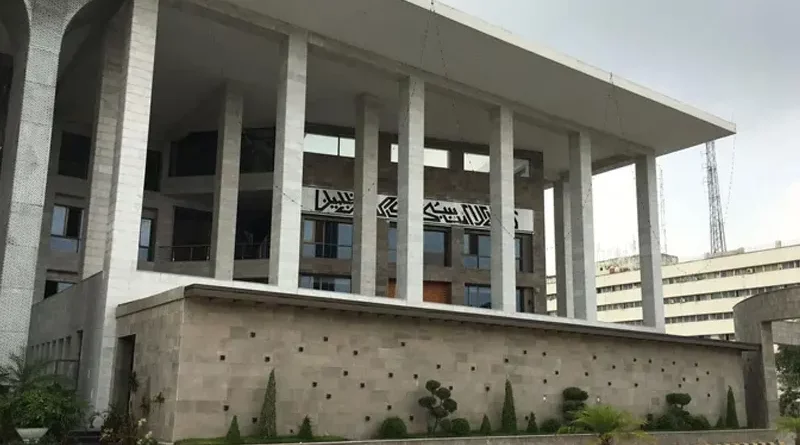IHC rejects DC Islamabad’s ‘unconditional pardon’ plea in contempt case
ISLAMABAD: The Islamabad High Court (IHC) rejected Islamabad Deputy Commissioner (DC) Irfan Nawaz Memon’s plea seeking unconditional pardon on Wednesday after he failed to appear for a hearing in the contempt of court case against him.
In the hearing conducted by IHC’s Justice Babar Sattar, the court asked Memon to submit his response to a show-cause notice issued regarding the matter by Monday, while he was also barred from travelling abroad. Justice Sattar also turned down his request to transfer the contempt of court case to another bench.
The court had also issued a show-cause notice to DC Islamabad for non-attendance, despite the rejection of his request for exemption from attendance. Justice Sattar said he will issue a judgment on the case next week.
The IHC will issue a verdict in the contempt of court case on March 1, announcing to adjourn the hearing till then.
A day earlier, the IHC had ordered Memon’s arrest and asked authorities to place his name on the no-fly list for skipping proceedings of a contempt case over the detention of Pakistan Tehreek-e-Insaf (PTI) leader Shehryar Afridi under the Maintenance of Public Order (MPO) ordinance.
The ordinance provides the government with vast powers of detention and has been used by authorities to round up and detain PTI leaders following the May 9 riots.
Justice Sattar was hearing the case against Islamabad DC and Islamabad Senior Superintendent of Police (SSP) Operations Malik Jamil Zafar for exceeding their authority by issuing orders under Section 3 of the MPO.
During the hearing, SSP Operations Zafar and Superintendent of Police (SP) Farooq Buttar appeared upon being summoned by the court. At the same time, the lawyer representing Islamabad DC submitted a plea for Memon’s exemption from the court.
Meanwhile, Memon, who was present at the hearing today, said he has not missed any of the 18 hearings in the case and that he leaves himself at the court’s mercy.
Justice Sattar, who was upset at the DC for his previous absence, remarked: “Do you think this is a joke, you are being held in contempt of court [case]. You issued 69 MPO orders for 970 days.”
Memon’s lawyer, Raja Rizwan Abbasi, requested the court to hear the case after a while, as he was angry during the hearing.
“This case was supposed to be completed yesterday, it could not be done because of you,” the IHC judge remarked, questioning DC Islamabad whether he knew the court’s order.
“I cannot even think of disobeying the court order,” Memon replied.
Justice Sattar asked DC Islamabad if benches would now be formed as per his choice when he urged the transfer of the contempt case to another bench.
DC Islamabad’s non-appearance here was not an obstacle to justice, his lawyer said, adding that Memon had no intention of undermining the court’s authority.
“The court is requested to dismiss the contempt of court case,” he pleaded.
During his argument, Memon’s counsel read the text of DC Islamabad’s indictment.
“There are three types of contempt of court, civil, criminal and judicial. This court action was initiated due to obstruction of justice,” he said, arguing that the case does not meet section 6 of contempt of court.
Abbasi said that the order of 3MPOs were quashed on a court directive and a new MPO order was issued later, while the second one was issued by district magistrate Rawalpindi.
“If there was contempt of court, it was not by DC Islamabad, but by DC Rawalpindi,” the lawyer said, adding he doesn’t want to throw anyone under the bus.
He urged the court to look at the whole situation.
“On August 5, Shehryar Afridi’s party leader was arrested. The situation of May 9 is also in front of everyone,” he said, adding that the Intelligence Bureau informed the capital’s administration about the worsening law and order situation and agitation.
The district intelligence committee, he added, included representatives of all sensitive agencies and expressed fear of attacks on government buildings, GHQ Chowk near F-9 Park in Islamabad.
Abbasi added that there was no malice in issuing the MPO order by the district magistrate.
“On May 16, the first MPO order was quashed. MPO orders were issued even after show cause notices were issued in the case,” Justice Sattar remarked, adding that the most the court can say is that the order is not correct.
It stopped when “we removed their power” to issue MPO orders, the IHC judge added.
The lawyer argued that the law and order situation may have cost someone’s life if the order wasn’t issued.
“In this situation, the court should have asked why action was not taken in the light of intelligence reports,” added the counsel.
Meanwhile, Abbasi also presented the transcript of Shehryar Afridi’s inflammatory speeches ahead of his arrest. He argued that the politician used threatening language and tried to provoke people with his words.
During the hearing, the Senior Superintendent of Police Operations Jameel Zafar’s lawyer Shah Khawar also presented his arguments in the case.
“The police might have evidence that Shehryar Afridi provoked the mob while sitting in jail?” Justice Sattar asked the SSP.
“Did you recommend issuing MPO against these people also?” the judge questioned him.
“Our focus was on leadership,” replied the SSP.
“If a guy is already in jail, what will you do with him? Put him back in jail again?” Justice Sattar remarked, directing him to submit the composition of the district intelligence committee and terms of reference.
After the completion of his lawyer’s arguments, the SSP submitted an unconditional apology from the court.

